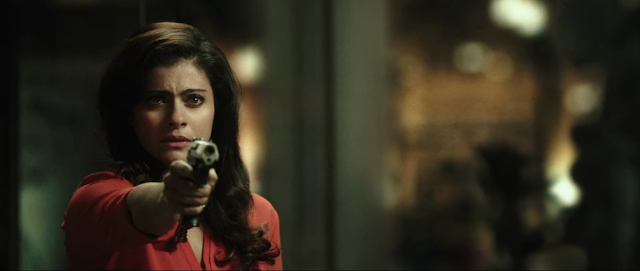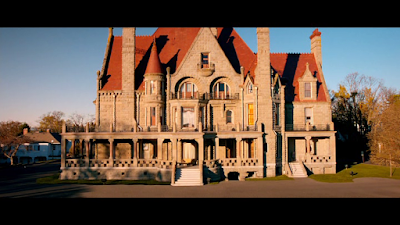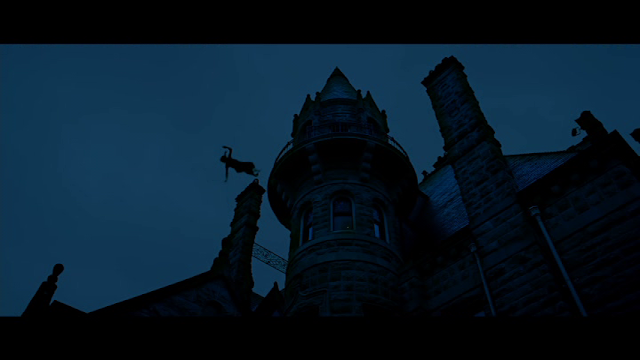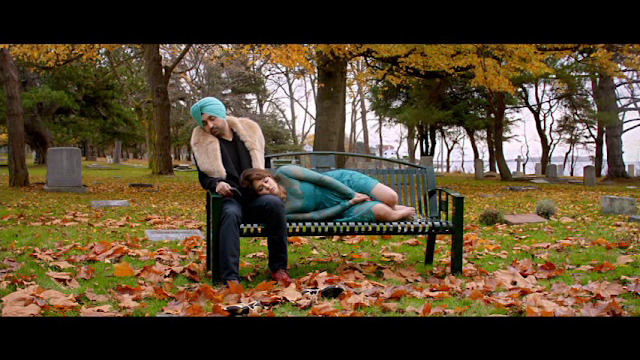If you're looking for a Bollywood Christmas movie, pickings are decidedly slim. There's Bada Din, which is fantastic and which I reviewed years ago, and there's Hide & Seek, an okayish slasher movie featuring a killer Santa prowling through a deserted shopping mall, but after that you have to settle for vaguely Christmas adjacent movies like Dilwale (2015), set in largely Christian Goa, in which Christmas lasts just long enough to rip off a scene from Love, Actually.
Let's start with Veer (Varun Dhawan.) Veer works as a mechanic in the garage owned by his brother Raj (Shah Rukh Khan.) Veer is a simple soul; he likes fast cars and . . . well, that's pretty much it. Fast cars. Until, that is, he meets Ishita (Kriti Sanon), and immediately falls in love.
One night while out on the town the pair run afoul of a gang of drug dealers. Veer beats them up, but later they ambush him and beat him badly enough to put him in the hospital. At which point his older brother Raj, gentle, responsible Raj, covers his face, tracks the drug dealers to their lair, beats them all up, then burns their merchandise. When the goons say that they work for King (Boman Irani) and he'll have his revenge, Raj tells them to look for Kaali.
And we flash back fifteen years to an unnamed city in Bulgaria, where two crime cartels are battling for control of the city, one run by Dev Malik (Kabir Bedi) and one by Randhir Bakshi (Vinod Khanna) and his son and right hand man, Kaali (SRK).
During a car chase, Kaali accidentally hits a woman named Meera Dev Malik (Kajol) with his car, and if you noticed her surname, you're paying more attention than Kaali is. Kaali is fascinated by her, and she is surprisingly open-minded about the whole "brutal gangster" thing, so he wages a full Shah Rukh Khan charm offensive and apparently wins her over.
It's obviously a trick. Meera is Dev Malik's daughter, and ambushes Kaali and his men during a gold shipment. On a whim, she leaves him alive. Soon after, he saves her from falling off a cliff (long story) and she falls for him. Will she be able to win him back? Yes, thanks to the most expensive musical number in Bollywood history. They resolve to tell their respective fathers about the relationship, and it goes badly.
The movie flashes forward to 2015 Goa. Veer wins Ishita's heart thanks to the aforementioned scene from Love, Actually and the nice young couple decide to tell their respective family, starting with Raj. Raj is delighted, and goes to meet with Ishita's sister to formalize the proposal, only to discover that the sister is Meera. The young lovers find themselves suddenly star-crossed, and since it is really, really obvious that Raj and Meera have a history together, they resolve to get their older siblings to fall in love . . . again. What could possibly go wrong?
Let me deal with my Festivus grievances before I get to my Christmas delight. Boman Irani is a fine actor, more than capable of playing a genuinely menacing character. That's not what he does here; King is a buffoon who is consistently played for laughs, and because he's the designated villain for the Goan sections of the story, that undercuts a lot of tension.
More seriously, because we see the flashbacks almost entirely from Raj's perspective, we understand his perspective and actions in a way that Meera can't, which means that he comes across as noble and self-sacrificing, while she seems like a terrible person. The fact that she is still somewhat sympathetic is entirely due to the strength of Kajol's performance.
And that leads me to the Christmas delight. The plot may be a bit muddled at times, but the cast is stellar. I would happily pay good money to see Shah Rukh and Kajol read the phone book together. It's not just their well-publicized chemistry; the pair work best when they are playing grown-ups with grown-up concerns, balancing their responsibilities with their love lives. It gives the relationship more weight than you get when Shah Rukh is cast opposite a youngster like Anushka Sharma or Deepika Padukone.
The first time I watched Dilwale, it struck me as a version of Romeo and Juliet gone wrong. On a second viewing, though, it seems more like something out of Jane Austen. He's too proud, she's too quick to judge, and they're both missing a key piece of information which will help them unravel their competing priorities. More gunfights than you usually see in Austen, though.











